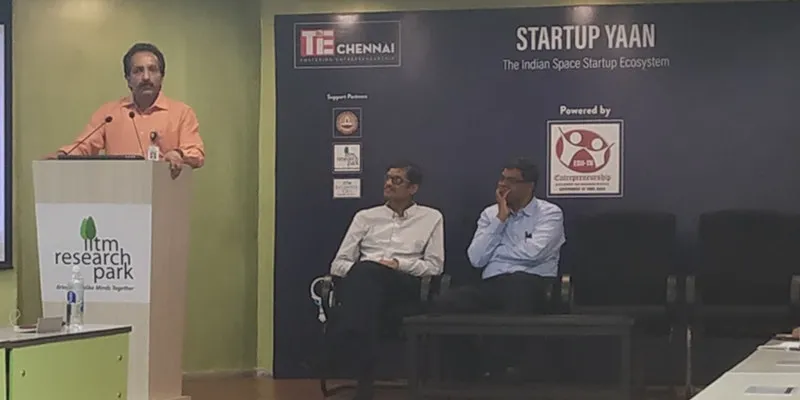What startups can learn from ISRO and other spacetech leaders
The local venture capitals are building their conviction to support spacetech startups, and with the help of ISRO and the ecosystem, better companies can be built in India.
What India witnessed during Chandrayaan 2’s hard landing on the lunar surface was ISRO’s spirit, as Prime Minister Narendra Modi put it.
We, as part of the spacetech startups ecosystem, got more than a glimpse of the spirit during the recent address by Dr Somnath, Director of ISRO’s Vikram Sarabhai Space Centre, during the Startup Yaan summit recently.

Here are some takeaways from his address and others from the Indian space startups:
Find out a market for the satellite to make it commercially viable
While building a satellite is a child’s play today, the key to its success is to find out applications - whether it is for scientific experiments, imaging, communication, or some other planned utility.
Reach out to former ISRO scientists for help and mentorship
India’s original space startup ISRO has several leaders who have gone through many a cycle of learning (successes and failures) by being involved in various missions. Their insights can be extremely valuable for innovators.
Understand better, the space startups business opportunities
Reusable rockets are the way to go, and it’s more profitable in launching multiple satellites in a year. Also, most money in the space business comes from ground infrastructure, like building ground stations, its communication, and imagery data.
Collaborating and making use of ISRO’s infrastructure
ISRO’s robust network of trusted partners can be useful for startups not keen on recreating the wheel. Also, collaborative efforts can bring forward new methods of materials management, production, integration, and testing, to accelerate progress.
Spend time to brainstorm and learn latest technologies
In this domain, there can be many failures, as space is a difficult terrain. Conventional electronics used in mobile phones or ground-based systems fail to work there. Advanced learnings, new design approaches, and rigorous procedures are needed to ensure systems survive very safely in space.
Satellite launch opportunities are huge, especially from India
Fueled by low costs, talent, and an awareness of use-cases, there has been an increased demand for small launch vehicles (<100 kgs). Startups like Agnikul Cosmos are already innovating in this sector, by reducing the satellite launch waiting period to two weeks.
Communication systems and technologies have a great future
As evident from various launches and ensuring snags that one may have encountered, innovations in satellite communication is critical for the success of the industry. Startups like Astrogate Labs, trust Optical Communication Systems to be a more efficient way of communicating than current technologies.
More investors are learning about space-tech opportunities
The gathering saw over a dozen investment professionals make it to IITM Research Park. According to Vishesh Rajaram, Managing Partner Speciale Invest, “The local VCs are building their conviction to support space-tech startups and with the help of ISRO and the ecosystem, we can build better companies from India.”
Along with Nitish Singh of Astrogate Labs and Srinath Ravichandran from Agnikul Cosmos, space-tech startups that presented in front of Dr Somnath and other leaders were: Sreemathy of Space Kids, Gadhadar Reddy from NoPo Nanotechnologies, Rohan Ganapathy from Bellatrix Aerospace, Nikitha C from SSERD, Ashresh Kumar from Manastu Space, Karthik Ravindran from SatSure, and Dhinesh Kanagaraj from Fabheads.
Concluding with Dr Somanth’s message to spacetech startups, “In the space domain, one can expect failures. The important qualities for a startup leader should be to continuously learn from failures, giving their 100 percent within their knowledge and capacity, resilience, and solving issues without losing heart or focus.
(Disclaimer: The views and opinions expressed in this article are those of the author and do not necessarily reflect the views of YourStory.)
(Edited by Suman Singh)




![[Funding alert] Spacetech startup Pixxel raises pre-seed round from growX Ventures and angels](https://images.yourstory.com/cs/2/fd6b2ee0-c6f4-11e8-af1c-974e95f3b2db/PIXXEL_FOUNDERS_21558884868943.jpeg?fm=png&auto=format&h=100&w=100&crop=entropy&fit=crop)




